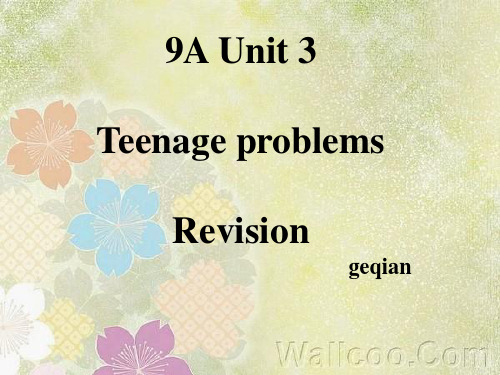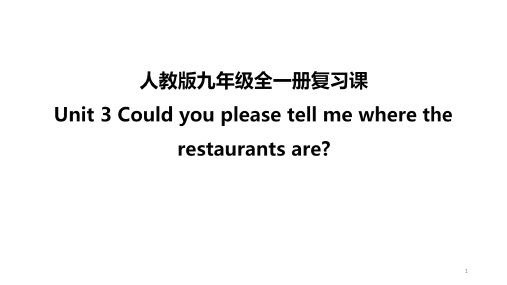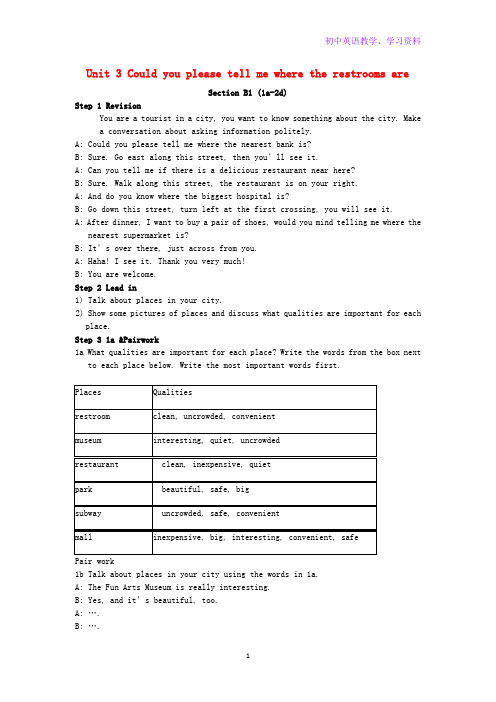9上Unit3Revision
- 格式:doc
- 大小:19.50 KB
- 文档页数:2




Module 1Unit3Language in useⅠ、Teaching model:Revision and applicationⅡ、Teaching method:Formal and interactive practiceⅢ、Teaching ObjectivesKnowledge objective1.To review the key words, phrases, and sentences of M1.2.To learn to use different tensesAbility objective1. To understand and use different tenses2. To learn to describe places and experiences.Moralobjective.To learn about the wonders of China and the world. Love our country, be proud of our country.Ⅳ、Teaching importance and difficulty1.To summarise and consolidate the use of articles2. To practise the new vocabulary and expressions.V、Teaching methodPWP method, task-based methodVI、Teaching aidsA tape recorder, multimedia and some picturesⅦ、Teaching ProceduresLearning Aims(学习目标)1.To review the key words, phrases, and sentences of M92.To use articles3. To learn to read large numbersStep 1:Review the knowledge(知识回顾)1.师友互查1)Review the phrasesgo through, fall away, on top of, look over, look across, look down,get out of , join in, agree with, man-made, more than, millions of,in one’s opinion2)课文原句在现1. I got out of the car, went through a gate and walked along a dark path.2. I looked over them, but it was silentand there was no sign of it.3. I looked down to the Colorado River4. Finally, I looked to my left and to my right.5. The sun rose behind me and shone ontherocks.Farbelowme,thegroundfell away and down to a river.6. I remained by the canyon for a bout half an hour…7.Let’s callWonder of the Worldand join in the discussion.8.I think the Giant’s Causeway is the most fantastic natural wonder.9. I think Victoria Falls in Africa is even more fantastic.10. But in my opinion, man-made wonders are more exciting than natural ones.(友情提示:师友朗读,理解记忆。

Unit 3 Could you please tell me where the restrooms areSection B1 (1a-2d)Step 1 RevisionYou are a tourist in a city, you want to know something about the city. Makea conversation about asking information politely.A: Could you please tell me where the nearest bank is?B: Sure. Go east along this street, then you’ll see it.A: Can you tell me if there is a delicious restaurant near here?B: Sure. Walk along this street, the restaurant is on your right.A: And do you know where the biggest hospital is?B: Go down this street, turn left at the first crossing, you will see it.A: After dinner, I want to buy a pair of shoes, would you mind telling me where the nearest supermarket is?B: It’s over there, just across from you.A: Haha! I see it. Thank you very much!B: You are welcome.Step 2 Lead in1) Talk about places in your city.2) Show some pictures of places and discuss what qualities are important for eachplace.Step 3 1a &Pairwork1a What qualities are important for each place? Write the words from the box next to each place below. Write the most important words first.Pair work1b Talk about places in your city using the words in 1a.A: The Fun Arts Museum is really interesting.B: Yes, and it’s beautiful, too.A: ….B: ….Step 4 Listening (1c)1)Listen to the conversations and complete the sentences.(1c)Conversation 1The boy asks about ___________, and the clerk tells him to go to Green Land.Conversation 2The girl asks about _________, and the clerk tells her to go to the corner of Market and Middle Streets.Conversation 3The mother asks about ________. The father wants to go to a ________ museum.The younger girl wants to go to a _______ museum. The boy wants to go to a __________ museum. The older girl wants to go to an ______ museum. The clerk suggests they go to the _________ museum.2)Listen again and answer the questions (1d)Conversation 1The boy asks about restaurants, the clerk suggests him go to Green Land, they have delicious salad.…Step 5 PracticeRole-play the conversations between the clerk and the tourist.A: Can you tell me where there’s good place to eat?B: Of course. What kind of food do you like?A: I’d like fresh vegetables.B: You can go to Green Land, they have delicious salad.A: ….Step 6 Presentation2a Where do you need to make polite requests? Think of some possible situations.Discuss them with your partner.➢In a foreign country.➢In public places like a bank, a post office, a library, a shopping mall, etc.➢At school.➢At home, especially when speaking to your elders.➢…Zhang Ming is traveling in the USA. He wants to go to a small town but he doesn'tknow the way now. What should he do?Step 7 DiscussionDiscuss the language you used to make this request (要求,请求). Was it the same each time? If not, discuss why not.Step 8 Reading1) Read the article and match paragraph with its main idea.2d Read the article and find the topic sentence for each paragraph.Paragraph 1When you visit a foreign country, it is important to know how to ask for help politely (adv. 礼貌地)….Paragraph 2Good speakers change the way they speak in different situations.Paragraph 3Usually polite questions are longer.Paragraph 4However, it is important to learn how to use the right language in different situations.2) Read the article again and answer the questions.Read paragraph 1 and answer the question.What else do we need to learn besides asking a question correctly when you ask for help?We need to learn how to be polite when we ask for help.Read paragraph 2 and answer the question.What do we need to think about when you talk to different people?We need to think about whom we speak to or how well we know them.Read paragraph 3 and answer the question.What can lead in to a request with a stranger on the street?“Excuse me, I wonder if you can help me” or “I’m sorry to trouble you, but …”before asking for help.2c Find all the direct questions and polite requests from the passage..2d Read the requests below. In the second column, write A if you would say it to someone you know and B if you would say it to a stranger. In the last column, write where you think these people are.Step 9 Language points1. convenientconvenient用作形容词,意为“便利的;方便的”,常用于句型“It+ be+ convenient (+for sb.) +to do sth.”中。

Unit3 Topic3 SectionC 教学设计Ⅰ. Material analysis本课是九年级第三单元第三话题的第三课时。
主活动是1a 和2。
1a 通过小组汇报分享学习英语的经验,老师补充总结,让学生从中获得学习英语的策略。
1b通过填充图表,培养学生获取信息的能力。
1c 是个对话活动,复述1b 里面所提到的各种学习策略。
2 重点在于巩固和运用1a 的重点用语。
3 要求学生学以致用,体现“在做中学”的理念。
学生在学习英语时大都会碰到相似的困难,因而本课对英语学习具有较好的借鉴意义。
本课还可以让学生知道分享学习经验也是一种快乐。
3 作为写作训练,需要学生整合所学知识,留作家庭作业,以便学生有充足的时间去完成。
Ⅱ. Teaching aims1. Knowledge aims:掌握本课的重点词汇和短语,继续学习“how / what ...+ to do sth.”。
2. Skill aims:继续运用构词法来猜测本课新词的含义,读出新词的发音。
学习运用scanning,来迅速找到所需要的信息。
3. Emotional aims: (optional)鼓励学生在学习英语时,要学会求助,学会分享。
4. Culture awareness: (optional)在学习英语时不能逐字逐句地翻译,要尽可能地按照英语的思维去理解句子,即要掌握特定的习语。
Ⅲ. The key points and difficult points1. Key points:Words and phrases: review, preview, translate, discussion, exactly, honor, achieve, aslong as, stick to (doing) sth., share...with ...., prefer doing sth.,advise sb.to do sth., agree with sb, as ...as possible, have(no)chance to do sth., practice doing sth.Sentences: I’m very glad to share our group’s opinions with you.It’s an honor to talk with all of you here.I’m sure that you’ll make great progress as long as you stick to them.1Thank you for listening!Grammar: how/what... + to do sth.2. Difficult points:在任务3 中,能够根据李明的“症状”,有针对性地“下药”。
外研版九年级上册英语Module9Unit3部分课文翻译外研版九年级上册英语Module9 Unit3局部课文翻译:Read the passage and choose the best title.阅读文章并选择最正确题目。
a)The history of the Internet因特网的历史b) The World Wide Web万维网c)The Internet and the Web因特网和万维网d) The future of the Internet因特网的将来The Internet has been around for many years, but it was the invention of the World Wide Web that made it really useful to people. Together, the Internet and the World Wide Web have changed the world.因特网已经存在很多年了,但是是万维网的独创使因特网对人们真正有用。
因特网和万维网一起变更了世界。
The Internet was invented by the US government in the 1960s, for the army to use. In the 1970s,scientists and businesspeople also wanted to use the Internet to send and receive messages. For some years,peoplecould only send very simple texts. They could not send photos or documents by the Internet.因特网是在20世纪60年头由美国政府独创的,用于军队运用。
牛津上海版九年上册Unit3知点九年上册牛津版本Unit31.response(s)n.反,作答responsiblea.的responsibilityn.2.beresponsiblefor=beinchargeof=takechargeof。
v.=have有owna.自己的owncar=acarofmyown我自己的ownern.主人n.自然naturala.天然的=viewn.点Inhisopinion,以他的点=Hethinks...(great)dange r在巨大的危中n.dangerousa.危的-moredangerous-themostdangerousalot改很大.manychanges多化n.exchange theirpresentsv.交他的礼物changeablea.多的9.person(s)n .人personal a.个人的personal ly ad.独立地10.reason(s) n.理由reason able a.合理的n.火trainsb.v.某人v.死dieddyingdieof死于dieoutdeada.死了的deathn.死亡v.n.尊重showrespecttosb.=respectsb.某人表示尊重friendswithsb.与某人交朋友befriendlyto=某人友friendship n.bekindto好的友v.咬hide-hid-hiddenv.藏v.choicen.高的a.unhappy不高a.happil y 高地ad.happiness幸福n.不健康unusual不常的unlucky不幸运的unnecessary不重要的a.有空的,免的,自由的free dom n.自由1.expense(s)n.用collegeexpenses大学用(high/low) expensivea.昂的moreexpensive-themostexpensiven.信心,信任havefaithin⋯有信念faithful忠的a.faithfully忠地ad.3.extremely=very/quite=terribly= completelyad.非常sb.v.使某人惊tooursurprisen.使我惊的是5.surprising/amazingn ewsa.令人异的消息6.besurprised/ama zedata.。
9上 Unit3 Revision(一)Ⅰ.复习目标:掌握本单元重点词汇、词组和句型。
Ⅱ.复习重难点:正确使用重点词汇、词组和句型。
Ⅲ.复习方法:reciting, practicing and testing
Ⅳ.复习步骤:
一、预习检测:默写单词
二、复习巩固
1. Read the words.
2. Talk about the usages of some important words.
三、Language points:详见复习讲义
四、当堂检测:《学习与评价》Test for Unit3(一、四、五)。
五、Homework: 背出重点词组、句型,完成错题再练。
9上 Unit 3 Revision(二)
Ⅰ.复习目标:1.语法: Object clauses introduced by question words.
Giving suggestions.
2.书面表达:To write a report on stress among teenagers.
Ⅱ.复习重难点:正确使用
Ⅲ.复习方法:reciting, practicing and testing
Ⅳ.复习步骤:
(一)语法知识: 详见复习讲义
(二)书面表达:How to write a report on stress among teenagers.
本单元的话题是青少年问题。
九年级的学生面临着许多的问题,有着各种压力,需要向别人倾诉并寻求帮助。
在帮助他人解决生活或学习方面所遇到问题分这类文章中,常包含以下三个方面:1.介绍情况,介绍询问者的个人资料及学习情况;2.阐述原因,提出建议,这部分要分别列出常见的问题及采用的解决方法;3.结论,提出祝愿和希望。
常用写作句型:You are unhappy with...
What/How about...
You also worry about...
You always feel sad/ angry/ stressed/ about...
Why don’t you/ not...
I hope you think my advice/ suggestions is/ are worth taking.
Have a try: 《学习与评价》P45 第六部分书面表达
(三) 当堂检测:《学习与评价》Test for Unit3(二、三)。
(四)Homework: 1、完成《导学案》总复习第35课时9A Unit3的相关练习;
2、准备Unit3的测试。